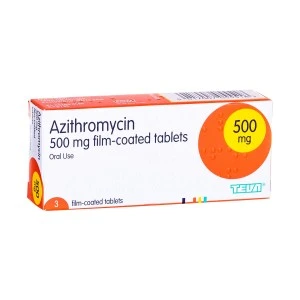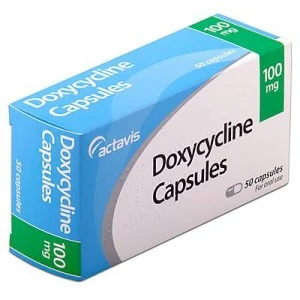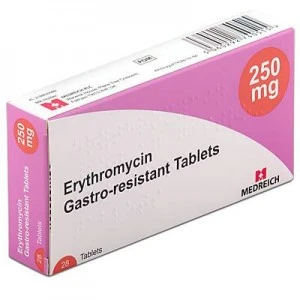Chlamydia
Chlamydia is a common sexually transmitted infection that can have serious health consequences if left untreated. While it often presents no noticeable symptoms, being aware of the signs can help with early detection and timely treatment. Familiarise yourself with the symptoms and signs of chlamydia to protect your health and that of your sexual partners.
Azithromycin
- Treatment not available
- Available through your GP
- Visit Sexual Health Clinic
Doxycycline
- Effective treatment for chlamydia
- 1 week course of treatment
- Sent from a UK pharmacy
Erythromycin
- Treatment not available
- Available through your GP
- Visit the Sexual Health Clinic
Chlamydia Symptoms and Signs
Chlamydia is a common sexually transmitted infection that can affect both men and women. It is important to be aware of the symptoms and signs associated with chlamydia, as they can vary or may not be present at all. Identifying these symptoms can help in early detection and seeking timely medical attention. Some of the common symptoms to watch out for:
- Unusual Discharge: One of the most common symptoms of chlamydia is an abnormal discharge from the penis or vagina. This discharge may be clear or cloudy and may have a strong odour.
- Pain or Burning Sensation: Many individuals with chlamydia experience pain or a burning sensation during urination. This discomfort can occur in both men and women.
- Painful Intercourse: Chlamydia infection can cause pain or discomfort during sexual intercourse.
- Abdominal Pain or Pelvic Pain: In some cases, chlamydia can lead to abdominal pain or pelvic pain, particularly in women. This pain may be mild or severe and can sometimes be mistaken for menstrual cramps.
- Testicular Pain: Men infected with chlamydia may experience pain or swelling in the testicles. This symptom is less common but should not be ignored if present.
It's important to note that chlamydia can also be asymptomatic, meaning it does not cause any noticeable symptoms. As a result, many individuals may unknowingly have chlamydia and can unknowingly transmit the infection to their partners. Regular STI testing is essential for early detection, especially for sexually active individuals or those engaging in high-risk behaviours.
Chlamydia Transmission and Prevention
Chlamydia is primarily transmitted through sexual contact, including vaginal, anal, and oral sex. It can be passed from one person to another even if penetrative sex does not occur. The bacteria responsible for chlamydia, Chlamydia trachomatis, can infect the cervix, urethra, rectum, or throat.
Preventive Measures
To prevent the transmission of chlamydia and reduce the risk of infection, it is important to practice safe sexual behaviours. This includes using condoms correctly and consistently during every sexual encounter, including vaginal, anal, and oral sex. Condoms act as a barrier and can significantly reduce the risk of chlamydia transmission. It is also important to note that sharing sex toys without proper cleaning and protection can also spread the infection.
Regular Testing for Prevention
Regular STI testing is another crucial aspect of prevention. Being aware of your sexual health status and getting tested regularly can help detect chlamydia and other sexually transmitted infections early, allowing for prompt treatment and reducing the risk of spreading the infection to others. Testing is particularly important if you have multiple sexual partners or engage in unprotected sex.
Partner Notification and Treatment
If you are diagnosed with chlamydia, it is important to inform your sexual partners about your diagnosis. They should also get tested and receive appropriate treatment to prevent reinfection and further transmission.
Remember, practising safe sex and getting tested regularly are vital steps in preventing chlamydia and maintaining good sexual health.
Diagnosis and Testing For Chlamydia
Diagnosing chlamydia involves specific testing methods to detect the presence of the Chlamydia trachomatis bacteria. If you suspect you have chlamydia or have engaged in risky sexual behaviour, it is important to seek medical attention for accurate diagnosis and appropriate treatment.
Local sexual health clinics provide comprehensive services, including testing, treatment, and counselling for sexually transmitted infections. The most common method of testing for chlamydia is a swab test. During this test, a healthcare provider collects a sample from the affected area, such as the cervix in women or the urethra in men. The sample is then sent to a laboratory for analysis to determine if the bacteria are present. Urine tests are also commonly used, especially in men, as they offer a non-invasive and convenient way to collect samples for testing.
It's important to note that chlamydia infections can occur in areas that may not be routinely tested, such as the rectum or throat. If you have engaged in receptive anal or oral sex and are concerned about potential exposure, inform your healthcare provider so that appropriate testing can be conducted.
Chlamydia Home Test Kits
- SELFCheck Female Chlamydia Test £19.99
- Lab Chlamydia Test Kit £34.99
- Lab Full STI Urine Test Kit ( tests for 7 STIs) £169.99
- Lab Full STI Blood Test Kit ( tests for 7 STIs) £169.99
Treating Chlamydia
Doxycycline is a highly effective antibiotic for the treatment of chlamydia. It belongs to the class of antibiotics known as tetracyclines and works by inhibiting the growth and multiplication of the Chlamydia trachomatis bacteria.
When prescribed doxycycline for chlamydia, it is important to follow the recommended treatment regimen. The standard dosage is typically one 100 mg tablet taken twice daily for 7 days. It's crucial to take the medication as prescribed, even if you start feeling better before completing the full course of treatment. By completing the full course, you ensure that the bacteria are completely eradicated from your body.
It's important to note that during the treatment period, you should abstain from sexual activity to prevent spreading the infection to others. Additionally, it's advisable to notify your sexual partners about your diagnosis so that they can seek testing and treatment if necessary.
While doxycycline is highly effective in treating chlamydia, it is essential to adhere to the prescribed treatment regimen and complete the full course. Failure to do so may result in incomplete eradication of the bacteria, increasing the risk of complications and potential reinfection. Remember, taking the medication exactly as directed by your healthcare provider is vital for successful treatment and preventing the spread of chlamydia.
After completing the treatment, it is recommended to undergo follow-up testing to ensure that the infection has been successfully cleared from your body, typically around three months after treatment. Follow-up testing provides reassurance that the treatment was effective and helps detect any potential reinfections.
Partner Notification: Safeguarding Sexual Health Together
If you have been diagnosed with chlamydia, it is crucial to inform your sexual partners about your diagnosis. Partner notification is an important step in preventing the spread of chlamydia and safeguarding the sexual health of both you and your partners.
When notifying your partners about your chlamydia diagnosis, it's important to approach the conversation with sensitivity and care. Select a suitable time and location to discuss the matter openly and honestly. Explain that you have been diagnosed with chlamydia and encourage them to seek testing and treatment as soon as possible. It's important to emphasise that chlamydia is a common infection that can be easily treated with antibiotics.
Remind your partners that chlamydia can be asymptomatic, meaning they may not experience any noticeable symptoms. Even if they do not have symptoms, they may still be infected and at risk of complications if left untreated. Encourage them to prioritise their sexual health by seeking testing and treatment promptly.
If your partners are unsure about where to go for testing or treatment, you can recommend PrescriptionDoctor online resources or request a Home Lab Chlamydia Test Kit for £34.99; the sample can be taken from the comfort of your home. We offer confidential and discreet services. If the results are positive, your partner can request an online consultation for the treatment of Chlamydia. Emphasise the importance of completing the full course of treatment, as prescribed by a healthcare professional, to ensure successful eradication of the infection.
Partner notification is a responsible and proactive step towards preventing the spread of chlamydia and protecting the sexual health of everyone involved. By working together, you and your partners can promptly address the infection, reduce the risk of reinfection, and maintain healthy sexual relationships.
Chlamydia Follow-up and Peace of Mind: Ensuring Successful Recovery
After completing the prescribed doxycycline treatment for chlamydia, it is important to undergo follow-up testing. Follow-up testing provides reassurance that the infection has been successfully cleared from your body and offers peace of mind regarding your sexual health.
Post-treatment testing is essential for several reasons. Firstly, it ensures that the medication has effectively eliminated the bacteria from your body. By confirming the absence of chlamydia, you can have confidence in knowing that the treatment was successful.
Secondly, follow-up testing helps identify any potential reinfections. In some cases, individuals may be re-exposed to chlamydia after completing treatment, leading to reinfection. Detecting reinfection early allows for prompt treatment and minimises the risk of complications.
Lastly, post-treatment testing plays a role in breaking the chain of transmission. By getting tested and knowing your infection status, you can take appropriate precautions to prevent the spread of the infection to others. It also highlights the importance of notifying recent sexual partners about your treatment and encouraging them to seek testing.
Remember that even if you feel completely fine and have no symptoms, it is still important to undergo post-treatment testing. Chlamydia can be asymptomatic, meaning it may not cause noticeable symptoms in some individuals. Regular testing is the best way to ensure your sexual health and prevent any potential complications.
By following through with post-treatment testing, you can gain peace of mind, knowing that you have taken the necessary steps to confirm the effectiveness of the treatment and safeguard your health as well as the health of your sexual partners.
Additional Resources: Expanding Knowledge on Chlamydia and Sexual Health
At Prescription Doctor, we believe in empowering individuals with knowledge and providing access to reliable resources for further information. Here are some additional resources that can help you learn more about chlamydia, its treatment, and sexual health:
Sexual Health Clinics: Local sexual health clinics provide comprehensive services, including testing, treatment, and counselling for sexually transmitted infections. They can offer personalised advice and support tailored to your specific needs.
Online Resources: Several reputable websites and organisations offer valuable information about chlamydia, including symptoms, transmission, prevention, and treatment. Examples include the NHS website, World Health Organization (WHO) website, and reputable health-related websites.
Online Healthcare Providers: Prescription Doctor is an excellent resource for personalised information and advice for treating and diagnosing chlamydia. They can address any specific concerns you may have and provide guidance on testing, treatment, and follow-up care. Don't hesitate to reach out to Prescription Doctor for expert assistance.
Equipping yourself with accurate information and seeking professional advice will help you make informed decisions, protect yourself, and maintain a healthy lifestyle.
How long does it take to get rid of chlamydia?
References
More information about Chlamydia from the NHS
Authored By

Mohamed Imran Lakhi
MPharm - Lead PharmacistPublished on: 13/09/2018
Reviewed By

Dr Giuseppe Aragona
DoctorReviewed on: 21/06/2023
© 2013 - 2026 Al Muhsineen Limited. All Rights Reserved. Registered Pharmacy: 34 Halliwell Road, Bolton BL1 8RL. Registered Office: 254 First Floor, Shearbrow, Blackburn, England, BB1 8DS








